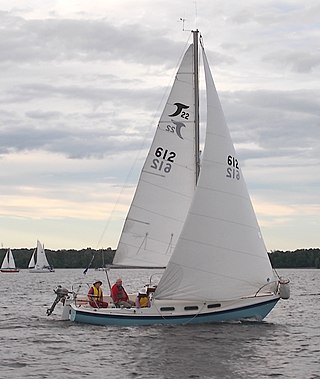Related Research Articles

The US Yachts US 22 is an American trailerable sailboat, that was designed by Gary Mull and first built in 1979.
The Triton 22 is an American trailerable sailboat, that was designed by Gary Mull and first built in 1985. The design is out of production.

The Tanzer 22 is a Canadian trailerable sailboat, that was designed by Johann Tanzer and first built in 1970. The design went out of production in 1986.
The US Yachts US 25 is an American trailerable sailboat, that was designed by Gary Mull and first built in 1981. The design is out of production.
The Triton 25, also called the Pearson 25, is an American trailerable sailboat, that was designed by Gary Mull and first built in 1984. The design is out of production.

The CS 22 is a Canadian trailerable sailboat, that was designed by John A. Butler and first built in 1971. The design is out of production.

The Starwind 223 is an American trailerable sailboat, that was designed by Cortland Steck and first built in 1984.
The Pearson Electra is an American trailerable sailboat that was designed by Carl Alberg as a Midget Ocean Racing Club (MORC) racer and first built in 1960.
The Buccaneer 240 and Buccaneer 245 are a family of American trailerable sailboats that were both designed as cruisers and first built in 1975.
The Typhoon Senior is an American trailerable sailboat that was designed by Carl Alberg as a cruiser and first built in 1984.
The Columbia 7.6 is an American/Canadian trailerable sailboat that was designed by Australian Alan Payne as a cruiser and first built in 1976.
The Columbia T-23, or Columbia T23, is an American sailboat that was designed by Australian Alan Payne and first built in 1973. The "T" designation indicates that the boat is designed to be trailerable.
The Freedom 24 is an American trailerable sailboat that was designed by William H. Tripp, III as a racer-cruiser and first built in 1994.
The Pearson 22 is an American trailerable sailboat that was designed by William Shaw as a racer-cruiser and first built in 1968.
The Pearson 23 is an American trailerable sailboat that was designed by William Shaw as a cruiser and first built in 1978.

The Pearson 24 is an American trailerable sailboat that was designed by William Shaw as a cruiser and first built in 1967.
The Seidelmann 25 is an American trailerable sailboat that was designed by Bob Seidelmann as a racer-cruiser and first built in 1977.
The Triton 21, also called the Pearson 21, is an American trailerable sailboat that was designed by Clark Scarborough as a racer-cruiser and first built in 1985.
The Venture 222 is an American trailerable sailboat that was designed by Roger MacGregor as a cruiser and first built in 1971.
The Windrose 18 is an American trailerable sailboat that was designed by W. Shad Turner as a cruiser and first built in 1974.
References
- 1 2 3 4 5 6 McArthur, Bruce (2022). "US 21 sailboat". sailboatdata.com. Archived from the original on 5 March 2022. Retrieved 5 March 2022.
- 1 2 3 4 5 6 7 8 9 Henkel, Steve: The Sailor's Book of Small Cruising Sailboats, page 144. International Marine/McGraw-Hill, 2010. ISBN 978-0-07-163652-0
- 1 2 3 4 5 6 Sea Time Tech, LLC (2022). "US 21". sailboat.guide. Archived from the original on 5 March 2022. Retrieved 5 March 2022.
- ↑ McArthur, Bruce (2022). "Pearson 21 (Triton 21)". sailboatdata.com. Archived from the original on 5 March 2022. Retrieved 5 March 2022.
- ↑ McArthur, Bruce (2022). "Triton 21". sailboatdata.com. Archived from the original on 5 March 2022. Retrieved 5 March 2022.
- ↑ McArthur, Bruce (2022). "Bayliner (Buccaneer/US Yachts) 1970 - 1979". sailboatdata.com. Archived from the original on 21 January 2021. Retrieved 5 March 2022.